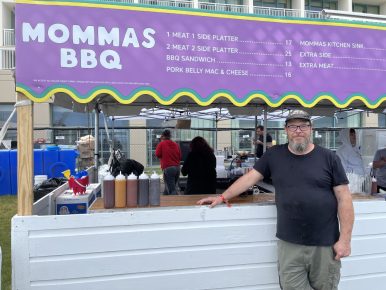After less than a year as the Norfolk-based commander of the Navy Region Mid-Atlantic, U.S. Navy Rear Adm. Christopher “Scotty” Gray is being promoted to lead the Navy Installations Command in Washington, D.C., pending U.S. Senate confirmation.
Gray, who will be promoted to vice admiral after approval by the Senate, was relieved by his successor, Rear Adm. Wesley McCall, during a ceremony in Norfolk on Friday, according to a Navy announcement. McCall previously commanded the Navy Region Southeast, which includes operations in Kansas, Oklahoma, Texas and much of the Southeastern United States. He was based in Jacksonville, Florida, at its Naval Air Station.
On June 30, 2022, Gray assumed command of the Navy Region Mid-Atlantic, which stretches from Wisconsin to North Carolina and includes 14 installations and nearly two dozen reserve outposts. A Virginia Beach native, he was stationed at the world’s largest Navy base, Naval Station Norfolk, where as many as 72,000 military, civilians and contractors work. He replaced Rear Adm. Charles “Chip” Rock, who commanded the mid-Atlantic region from 2018 to 2022.

If confirmed as commander of the Navy Installations Command (CNIC), Gray will be headquartered at the Washington Navy Yard in Washington, D.C., and will be responsible for all shore installations in all 11 Navy regions — including the mid-Atlantic. He will report to the chief of naval operations, Adm. Michael M. Gilday.
Vice Adm. Yancy Lindsey currently serves as commander of the Navy Installations Command, having assumed the job in May 2020.
Gray will likely have to wait a while for his Senate confirmation, as there is a backlog of senior military promotions in the legislative body, which is in a standoff over the Pentagon’s policy of covering travel and leave for troops seeking abortions.
McCall is a U.S. Naval Academy graduate with a bachelor’s degree in oceanography and holds a master of arts degree in national security and strategic studies from the Naval War College in Rhode Island. He was designated a naval aviator in 1992, and his operational assignments include tours with helicopter squadrons and serving as helicopter operations officer with the commander of U.S. Naval Forces Central Command/U.S. 5th Fleet. McCall, who also served as protocol officer for the chairman of the Joint Chiefs of Staff and commanding officer of Naval Station Mayport in Florida, became commander of Navy Region Southeast in April 2021.
Gray previously led the Navy’s Europe, Africa, Central region, based in Naples, Italy. He also was a naval flight officer and deployed on the aircraft carrier USS Dwight D. Eisenhower. Additionally, he commanded the Norfolk-based Carrier Airborne Early Warning Squadron 124. In addition to being responsible for as many as 90,000 active-duty personnel and 52,000 civilian employees, Gray was involved with Future Base Design, a plan launched in 2021 under which the Navy would lease desirable, underused land to private developers.
In a 2022 interview with Virginia Business, Gray said that he was working to make connections with Norfolk officials and find ways to benefit both the city and the base: “What I am communicating to them is: Let’s find ways to find win-win solutions to the problems that are facing the city and the problems that are facing the military.”


